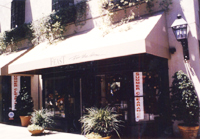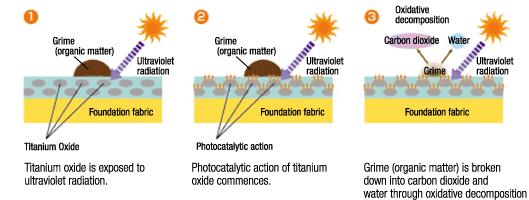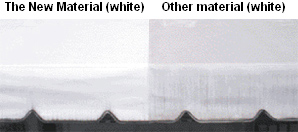Kuraray Now Marketing Decorative Awning Material
Photocatalytic decomposition of organic matter keeps this self-cleaning material cleaner longer.

On January 1, 2004 Kuraray will launch a new decorative awning material. A photocatalytic titanium oxide coating on this new awning material decomposes organic matter, and this, together with its superior hydrophilic properties, makes this material highly soil resistant.
Various materials offer some of the features needed in decorative awning material for sunshades for outdoor cafe, awnings for stores and housing complexes, and awnings for residential terraces, such as soil resistance, durability, weather resistance, bright coloration, and reduction of ultraviolet radiation. However, since decorative awnings are difficult to maintain once installed, the most important of these requirements is soil resistance.
This material has dual self-cleaning functionality. The photocatalytic action of its titanium oxide coating decomposes oils and other organic materials that adhere to it, and its hydrophilic properties make these substances easy to wash away. As a result, awning surfaces retain their beauty for long periods. Because it is difficult for rain marks and other grime to adhere to the surface of the material, awnings retain their original colors, even the whites and pastels that show soiling so readily. Cleaning costs are reduced and awnings retain their beauty over the long term, making this a breakthrough material that resolves an issue of many years' standing in the decorative awning industry.
Photocatalytic action using titanium oxide
Exposure of this awning material's titanium oxide coating to sunlight induces a photocatalytic reaction that breaks down organic matter soiling its surface into carbon dioxide and water. The hydrophilic effects of this photocatalytic reaction make these decomposed organic materials easy to wash away.
The new material, developed using photocatalyst technology licensed from TOTO LTD. and other technology jointly developed by Taiyo Kogyo Corporation and Nippon Soda Co., Ltd., represents Kuraray's first foray into the field of decorative awnings. Compared with previous efforts to achieve anti-soiling functionality, such as acrylic coatings and fluoride coatings, this material displays highly soil-resistant properties. In recent years, the decomposition and hydrophilic properties resulting from the use of photocatalysts have been a topic of great interest in the fields of exterior construction materials, vehicular transport equipment, cleaning equipment, and household goods.
Thinking first of the clean and beautiful brand image and impression we want to create for this material, we will be promoting the material for use in decorative awnings for franchise chains, up-market shops, and other commercial facilities, as well as for home awnings and a broad spectrum of other applications.


Characteristics of the New Material
1.Materials
| Foundation fabric | 100% polyester (with titanium oxide coating and fire retardant) |
|---|---|
| Facing and backing | polyvinyl chloride film laminate |
2.Features
- The photocatalytic action of the material's titanium oxide coating breaks down oily grime and other organic matter that adheres to the surface.
- The hydrophilic properties of the surface make awnings easy to clean.
- Compared with previous efforts to achieve anti-soiling functionality, such as acrylic coatings and fluoride coatings, this material displays highly soil-resistant properties.
- It is difficult for rain marks and other grime to adhere to the surface, even on colors that show up soil such as white and pastels.
- Cleaning and other maintenance costs are lower.
- The cleanliness and beauty at the core of the brand image are long-lasting.
3.Applications
Decorative sunshades for shops (franchise chains, up-market shops, etc.)
Sunshades for private residences, and for public facilities such as schools and hospitals (residential terraces, yards, etc.)
4.Product Specifications
94cm x 50m (roll)
5.Price
¥6,600/m (design price, excluding consumption tax)
6.Sales Channels
Through sales agents across Japan
7.Release Date
January 1, 2004
8.Sales Target
¥100 million in the first fiscal year
